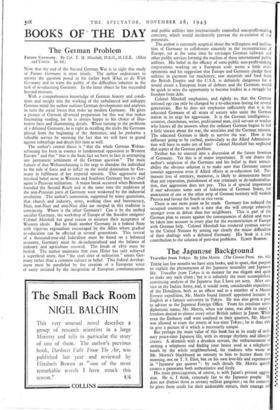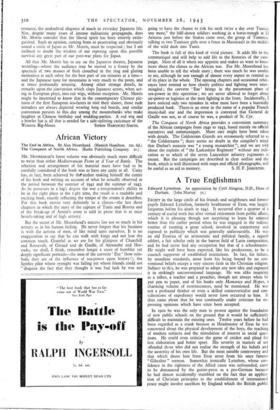The Japanese Background
Traveller from Tokyo. By John Morris. (The Cresset Press. ros. 6d.)
THESE last few months we have seen books, and to spare, that purport to explain the phenomenon of the Japanese mentality and Japanese life. Traveller from Tokyo is' in manner far too elegant and quiet to make any such claim ; but it is infinitely the most accomplished, convincing analysis of the Japanese that I have yet seen. After ser- vice in the Indian Army, and, it would seem, considerable experience of the Himalayas, both as an officer and as a member of a Mount Everest expedition, Mr. Morris found himself appointed lecturer in English at a famous university in Tokyo. He was also given a post as adviser to the Japanese Foreign Office. From his resultant semi- diplomatic status, Mr. Morris, when war came, was able to enjoy a freedom denied to almost every other British subject in Japan. While even the Embassy staff were confined to their quarters, Mr. Morris was allowed to roam the streets of war-time Tokyo ; he is thus able to give a picture of it which is necessarily unique. But perhaps the main value of this book lies in its study of ordi- nary peace-time Japanese life, with its strange rhythms and idiosyn- crasies. A skirmish with a drunken servant, the embarrassment of owning a telephone and finding your house used as a telephone- booth by the whole neighbourhood, the students who wrote on Mr. Morris's blackboard an entreaty to him to lecture them that morning, not on T. S. Eliot, but on his own love-life and experiences in " Japanese gay quarter ": by such details Mr. Morris quietly creates a panorama both authoritative and lively.
-Iis main preoccupation, of course, is with Japan's present aggres- sion. He is, I think, extremely fair to the Japanese people. He does not dismisi them as seventy million gangsters; the contrary, he gives them credit for their undeniable virtues, teir courage and
resource, the undoubted elegance of much in everyday Japanese life. Nor, despite 'many years of intense militaristic propaganda, does Mr. Morris consider that the liberal spirit has been entirely extin- guished. Such an opinion, coming from so penetrating and obviously sound a critic of Japan as Mr. Morris, must be respected ; but I am inclined to doubt the wisdom of our reposing upon this possible survival any great part of our post-war plans for Japan.
All that Mr. Morris has to say on the Japanese theatre, Japanese wrestling—where the audience may be moved to a frenzy by the spectacle of two masses of flesh crouched in the ring and glaring motionless at each other for the best part of ten minutes at a time— and the Japanese taste for mountains is very much to the point, and at times profoundly amusing. Among other strange details, he remarks upon the convention which claps Japanese actors, when act- ing in European plays, into red wigs, without exception. Mr. Morris might be interested to know that in the contemporary Chinese pic- tures of the first European sea-farers to visit their shores, those rude intruders are always depicted wearing long red beards, and similar convention persists to this _day among the mountebanks who make laughter at Chinese birthday and wedding-parties. A red wig and a bowler hat is all that is needed for a side-splitting caricature of the



























 Previous page
Previous page